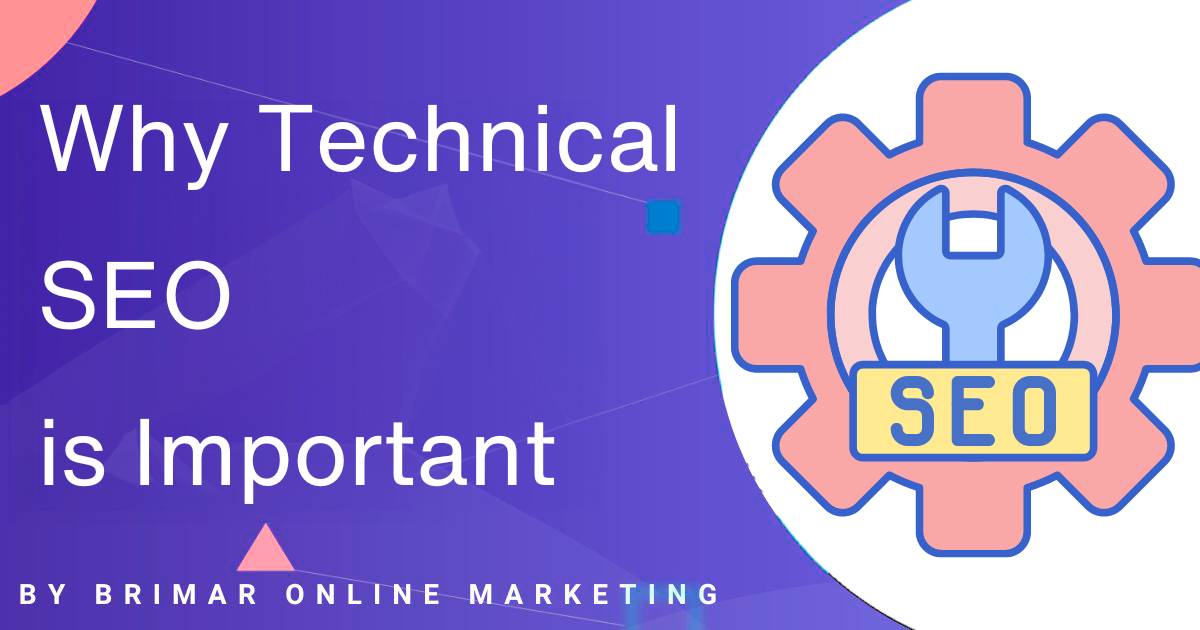
When thinking about SEO, the initial focus often lands on keywords, backlinks, and engaging content.
However, a crucial part of SEO operates behind the scenes: technical SEO.
Technical SEO helps your website meet the necessary requirements of modern search engines, ultimately boosting your organic rankings.
Here’s why technical SEO is vital and how it can make or break your online presence.
Understanding Technical SEO
Technical SEO focuses on refining the technical elements of a website to improve its presence in search engine results.
Unlike on-page SEO, which centers on content and keywords, or off-page SEO, which revolves around backlinks and social signals, technical SEO is about your website’s infrastructure.
It’s the foundation that allows search engines to crawl and index your site efficiently, ensuring that your content is accessible and understandable.
Start Attracting Customers Through SEO Today!
We can help you attract new customers through Tailored Search Engine Optimization Strategies for Your Business.
Key Components of Technical SEO
Website Architecture and Structure
A well-structured website is crucial for both users and search engines.
Good website architecture helps search engines crawl your site more effectively and allows users to navigate it with ease.
Clear URL structures and internal linking play a significant role here.
Internal links guide search engines and users through your content, helping to distribute page authority across your site.
They also improve the user experience by making it easier for visitors to find related content.
Consider using breadcrumb navigation to enhance your website’s structure.
Breadcrumbs provide a trail for users to follow back to the starting or entry point, reducing the number of actions a visitor needs to take to return to a higher-level page.
This not only improves user experience but also helps search engines understand the relationship between pages.
Page Speed and Performance
How quickly a page loads is crucial for both user satisfaction and improving your search engine rankings.
Slow-loading pages can lead to high bounce rates, where users leave your site before it even loads.
Google considers page speed as a ranking factor, so improving it can lead to higher rankings.
Tools like Google PageSpeed Insights can help identify issues affecting your page speed.
Best practices include optimizing images, enabling browser caching, and minimizing JavaScript and CSS files.
Implementing Accelerated Mobile Pages (AMP) can further enhance your page speed.
AMP is a framework designed to make web pages load faster on mobile devices by stripping down HTML and following streamlined CSS rules.
This not only improves user experience on mobile but also can positively impact your mobile search engine rankings.
Mobile Optimization
Given that most internet users browse the web on their mobile devices, ensuring your website is mobile-friendly is essential.
Mobile optimization ensures that your website performs well on smartphones and tablets, providing a seamless experience regardless of the device used.
With Google’s mobile-first indexing, the mobile version of your website is treated as the primary version for ranking evaluations.
Ensuring mobile responsiveness and fast load times on mobile devices can significantly boost your SEO performance.
Pay attention to mobile usability issues reported in the Google Search Console.
Issues such as clickable elements being too close together or text being too small to read can negatively impact your rankings and user experience.
Regularly testing your site on various mobile devices and using tools like Google’s
Mobile-Friendly Test can help ensure your site is optimized for mobile users.
Security
Security is another crucial aspect of technical SEO.
An SSL certificate ensures that data transmitted between your website and its users is encrypted and secure.
Websites with SSL certificates (indicated by HTTPS) are favored by search engines and are seen as more trustworthy by users.
Implementing SSL can positively impact your search engine rankings and enhance user trust.
Beyond SSL, consider additional security measures such as using secure sockets layer (SSL) protocols, regularly updating your website’s software, and implementing strong password policies.
Security breaches can lead to significant SEO issues, including site blacklisting by search engines and loss of user trust.
Crawlability and Indexability
For your website to appear in search results, search engines need to crawl and index your web pages.
An XML sitemap guides search engines through your website’s layout, ensuring they can locate and index all your pages.
Similarly, using canonical tags can prevent duplicate content issues by indicating the preferred version of a page.
Google Search Console is a valuable tool for monitoring and managing your site’s crawlability and indexability, allowing you to identify and fix any issues that arise.
Addressing crawl errors reported in the Google Search Console is essential.
Errors such as “404 not found” or “500 server errors” can prevent search engines from accessing your content.
Regularly checking for and resolving these errors ensures that all your important pages are indexed and available in search results.
Core Web Vitals
Core Web Vitals are a set of metrics introduced by Google that measure user experience.
They include Largest Contentful Paint (LCP), which measures loading performance;
First Input Delay (FID), which assesses interactivity; and Cumulative Layout Shift (CLS), which evaluates visual stability.
Optimizing for these metrics can enhance user experience and is essential for maintaining good rankings as they are now a part of Google’s ranking factors.
To improve your Core Web Vitals, consider optimizing your web server’s response times, using a content delivery network (CDN) to serve content faster, and reducing the size of your CSS, JavaScript, and image files.
Regularly monitor your site’s performance using tools like Google’s PageSpeed Insights and Lighthouse to ensure you are meeting the required standards.
Advanced Technical SEO Elements
Schema Markup and Rich Snippets
Schema markup is a type of data markup that helps search engines understand the content of your pages better.
Implementing schema markup can lead to rich snippets in search results, which are enhanced listings that provide additional information such as ratings, reviews, and images.
Rich snippets can improve your click-through rate (CTR) by making your listings more attractive and informative.
There are various types of schema markup you can implement, such as product information, event details, and FAQ sections.
Using a tool like Google’s Structured Data Markup Helper can simplify the process of adding schema markup to your pages, ensuring that your content is properly formatted for rich snippets.
Handling Duplicate Content Issues
Duplicate content can perplex search engines and weaken your ranking authority.
It’s essential to identify and resolve duplicate content issues to ensure that each page’s authority is not split.
Using canonical tags helps specify the original version of a page, preventing duplicate pages from causing SEO problems.
Regularly audit your website for duplicate content using tools like Copyscape or Screaming Frog.
Additionally, ensure that any syndicated content on your site is properly attributed, and use canonical tags to point to the original source.
This helps prevent search engines from penalizing your site for duplicate content.
Managing Crawl Budget
Crawl budget refers to the number of pages a search engine will crawl on your site within a given timeframe.
Efficiently managing your crawl budget ensures that important pages are crawled and indexed.
This involves optimizing your site structure, reducing unnecessary pages, and fixing crawl errors.
Tools like Google Search Console can help monitor your crawl budget and identify any issues.
To optimize your crawl budget, ensure that your robots.txt file is correctly configured to block irrelevant pages from being crawled.
Additionally, avoid creating orphan pages;
Pages that are not linked to from other pages on your site; as they can waste your crawl budget and hinder indexing.
Technical SEO Tools and Best Practices
Google Search Console
Google Search Console is indispensable for every website owner.
It provides insights into your site’s performance, identifies technical issues, and offers suggestions for improvements.
Regularly using Google Search Console helps ensure your site remains in good health and performs well in search engine rankings.
Make it a habit to review the reports and notifications in Google Search Console.
This includes checking for coverage issues, mobile usability problems, and security vulnerabilities.
By staying on top of these reports, you can quickly address any technical issues that arise and keep your site optimized for search engines.
Conducting a Technical SEO Audit
A thorough technical SEO audit is crucial for identifying and fixing technical issues that could be harming your site’s performance.
This involves analyzing various aspects of your site, including page speed, mobile optimization, security, crawlability, and more.
Regular audits help maintain a well-optimized website and ensure long-term success.
When conducting a technical SEO audit, start by creating a checklist of key areas to examine.
This should include checking your site’s XML sitemap, verifying your robots.txt file, testing page load speeds, and assessing mobile-friendliness.
Tools like Screaming Frog, Ahrefs, and SEMrush can help streamline the audit process and provide detailed insights into your site’s technical health.
The Role of Technical SEO in SEO Strategies
Integration with On-Page and Off-Page SEO
Technical SEO supports on-page SEO efforts by ensuring that your content is accessible and indexable.
It also complements off-page SEO tactics by creating a strong foundation for your site.
For example, a fast, secure, and mobile-friendly site enhances the effectiveness of link-building campaigns and social media marketing efforts.
By integrating technical SEO with your content marketing strategy, you can ensure that your high-quality content reaches a broader audience.
This includes optimizing your website’s speed and structure to enhance user engagement and leveraging schema markup to improve the visibility of your content in search results.
Enhancing User Experience
Technical SEO plays a crucial role in enhancing user experience.
Faster page loads, mobile optimization, and secure connections all contribute to a better user experience.
A positive user experience can lead to lower bounce rates, higher engagement, and ultimately better search engine rankings.
Focusing on user-centric metrics, such as Core Web Vitals, can help you understand and improve the aspects of your site that matter most to visitors.
Regularly gather user feedback and use analytics tools to monitor how users interact with your site.
This data can provide valuable insights for optimizing user experience and maintaining high levels of engagement.
Ensuring Long-Term Online Success
Maintaining a well-optimized website through technical SEO is essential for long-term online success.
It helps attract and retain organic traffic, improves search engine rankings, and ensures that your site remains competitive in an ever-evolving digital landscape.
Regular updates and audits are necessary to keep up with changes in search engine algorithms and best practices.
Investing in continuous education and staying informed about the latest SEO trends and updates is crucial.
Join SEO communities, attend webinars, and follow industry blogs to stay ahead of changes and ensure your technical SEO practices remain effective.
Final Thoughts
Technical SEO serves as the foundation for any robust SEO strategy.
It ensures that your website is accessible, secure, and optimized for both users and search engines.
By focusing on the technical aspects of your website, you can improve its performance, enhance user experience, and achieve higher search engine rankings.
Whether you’re a website owner, content creator, or SEO professional, prioritizing technical SEO is essential for achieving and maintaining online success.
Our SEO Services Have Helped Our Clients Increase Their Revenue!
“I highly recommend Brimar if your looking to grow your online business. You will be satisfied with the high level of expertise and high quality of services. It has helped my business grow by leaps and bounds.”
CEO



